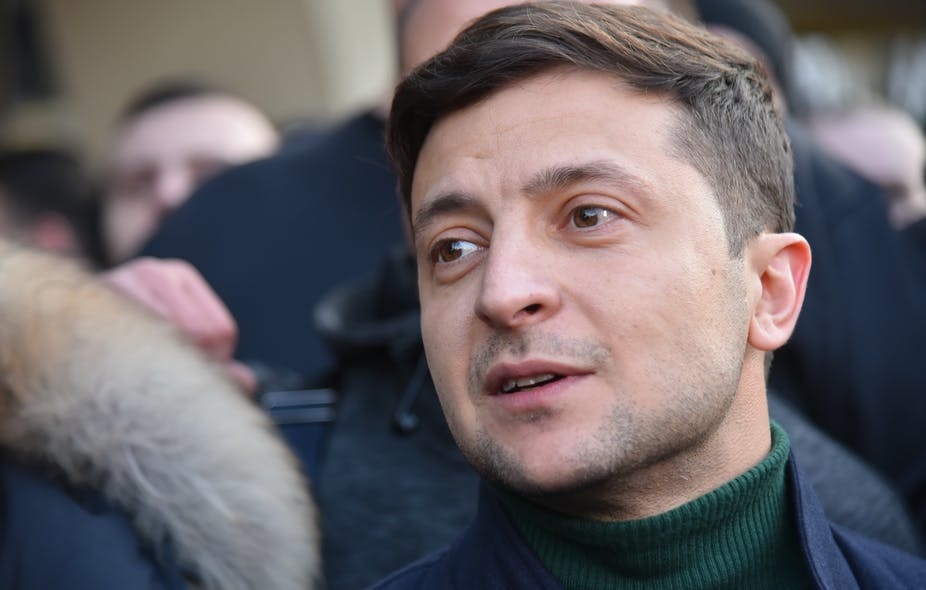Can Volodymyr Zelenskiy unite Ukraine and revive trust in politics? (EPA)
Co-written with Tatyana Malyarenko of the National University Odesa Law Academy and originally published by The Conversation:
Ukraine’s presidential election campaign is a tragic indictment of the country’s current political state. Most candidates have adopted populist strategies, voters appear highly irrational in their preferences, trust in the political system and its leading representatives is extremely low, and the country remains deeply divided and perpetually stuck in a systemic social, political, and economic crisis partly of its own making.
The current favourite in public opinion polls is Volodymyr Zelenskiy, a young comedian who has yet to present any meaningful electoral platform. Despite this, he currently has 25-28% of the support among voters. This is roughly twice what the current President, Petro Poroshenko, and the former Prime minister, Yulia Tymoshenko, can muster. They currently each have 13-16% support.
But perhaps the support for Zelenskiy is less irrational than it might at first seem. His non-program is only slightly more bizarre than the programmes of other presidential contenders. Each offers little, if anything, by way of credible strategies for economic development, public governance, a permanent end to the war in the eastern Donbass region, or for dealing with Russia’s annexation of Crimea.
Given such a lack of vision and leadership among many of the current elite, it is unsurprising that trust in public institutions is at an unprecedented low. Only 16% of Ukrainians trust their current president and only 11% trust the government. Trust in Parliament is even lower, at 8%. Moreover, antipathy towards the current president stands at more than 50%. Under such conditions, almost any outsider with almost any programme (or none at all) is unlikely to fare worse than representatives of the established political class.
The Landscape
In this election campaign, two major societal cleavages have become particularly prominent – one geographical, the other generational.
The traditional east-west divide in Ukraine persists despite Russia’s annexation of Crimea and support for rebels in the eastern Donbas region. A combination of “Ukrainianization” (a policy of marginalizing Russian language, culture, and heritage) and economic decline in the once industrialized east has deepened the distrust of the central government among southern and eastern Ukrainians. Here, only 6-8% support the current president while between 73% and 76% do not support him.
In light of these circumstances, it is surprising that the presidential election campaign has not become more of a direct competition between eastern and western Ukrainian elites. This is partly because eastern and western candidates are also competing with each other, splitting the regional vote, and partly because they are all equally threatened by the meteoric rise of Zelenskiy.
This dynamic is particularly evident in the southeast. Infighting within the so-called Opposition Bloc, which functions as a successor to former president Victor Yanukovych’s Party of the Regions, has prevented the selection of a single candidate to represent the interests of that part of the country. With the electoral significance of the southeast already diminished given Russia’s annexation of Crimea and occupation of Donbass, even the most popular southeastern candidate, Yuriy Boyko, only has 11% of support across Ukraine.
The Generation Game
The second cleavage is generational. Zelenskiy monopolizes support among those aged 18-40 across all of Ukraine’s regions. Zelenskiy also leads in the 40-50 age bracket and is only slightly behind current President Poroshenko among 50 to 60-year-olds. Among those aged over 60, however, he has no support at all.
Zelenskiy’s supporters are driven by a desire for new faces and fresh approaches and by their dismay at the systemic corruption that has long plagued Ukraine’s public sector. Especially for the younger generation, support for Zelenskiy is a rejection of Poroshenko and his government, which campaigns under the slogan “language, army, and church”.
This conservative agenda is deeply unpopular among a younger generation of Ukrainians. They were at the heart of both the Orange revolution of 2004/5 and the pro-European Euromaidan movement a decade later but now lack any credible social, economic or political representation in Ukraine.
Current policies have strengthened media censorship, attacked civil society, and made education and culture more religious, despite the formal separation of state and church in the Ukrainian constitution. While this clearly appeals to an older generation, for many younger voters the predominant attitude is “anyone but Poroshenko” – with Zelenskiy the most credible non-establishment candidate available.
What Now?
Nevertheless, no matter what the outcome of Ukraine’s presidential elections on March 31, there is no realistic prospect of a “quick fix” for the country’s protracted crises. Neither a second term for Poroshenko nor a victory for Tymoshenko or Zelenskiy is likely to resolve Ukraine’s problems.
A victory for Poroshenko, unlikely as it may seem at present, will cement the country’s current course, which the majority of Ukrainians do not support. A Tymoshenko victory, meanwhile, is unlikely to offer much more than cosmetic changes.
In November 2018, 78% of respondents in a survey thought that Ukraine was moving in the wrong direction. In February 2019, however, this figure had decreased to 65% – most likely because people had greater optimism that the election year might result in meaningful change. Zelenskiy – the symbol for such change – may well be honestly determined to address Ukraine’s deep-seated problems, but he will face significant resistance from the established political-economic class.
The likely difficulties of implementing meaningful and sustainable reforms will result in further public disengagement and yet more emigration of the younger generation (current figures put emigration at a million people annually, with 54% of the 18-35 age segment willing to emigrate).
For now, the prospects of whoever is elected Ukraine’s president to unite the country under a common vision and renew a broken social contract are daunting at best.![]()

